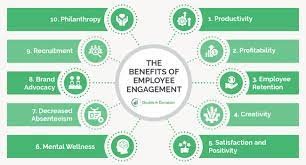In the dynamic landscape of the modern workplace, the significance of employee engagement and satisfaction cannot be overstated. Beyond being buzzwords, these concepts represent the foundation of a thriving, innovative, and resilient organization. As businesses recognize the pivotal role that engaged and satisfied employees play in overall success, a strategic focus on creating a positive workplace culture becomes imperative. Let’s delve into why employee engagement and satisfaction are crucial pillars for organizational excellence.
1. Boosted Productivity and Performance
Engaged and satisfied employees are inherently more productive. When individuals find fulfillment and purpose in their roles, they invest discretionary effort into their work. This heightened level of commitment translates into increased productivity, improved job performance, and a positive impact on organizational outcomes.
2. Enhanced Employee Retention
Employee turnover can be a significant cost for organizations. Engaged and satisfied employees are more likely to stay with their current employer. A positive work environment, recognition of achievements, and opportunities for professional growth contribute to higher retention rates, reducing recruitment and training costs.
3. Positive Impact on Company Culture
Employee engagement and satisfaction are integral to shaping a positive company culture. A workplace where employees feel valued, heard, and appreciated fosters a collaborative and supportive environment. This positive culture, in turn, attracts top talent, enhances teamwork, and contributes to the overall well-being of the organization.
4. Increased Innovation and Creativity
Engaged employees are more likely to contribute ideas, take initiative, and think creatively. When individuals feel a sense of ownership and empowerment, they are motivated to bring their innovative thinking to the table. This infusion of creativity becomes a catalyst for organizational innovation and adaptability in a rapidly changing business landscape.
5. Higher Levels of Employee Morale
Employee engagement and satisfaction are directly linked to morale. When employees feel positive about their work, their team, and the organization as a whole, morale is elevated. High morale contributes to a more enjoyable workplace, where individuals are motivated to give their best, even in the face of challenges.
6. Improved Employee Health and Well-Being
The well-being of employees extends beyond the professional realm. Engaged and satisfied employees are likely to experience improved mental and physical health. A supportive work environment that prioritizes employee satisfaction contributes to reduced stress levels, enhanced work-life balance, and overall better health outcomes.
7. Effective Communication and Collaboration
Engaged employees are more likely to communicate effectively and collaborate with their peers. Open lines of communication foster teamwork and the exchange of ideas. When employees feel engaged, they are more likely to share insights, provide constructive feedback, and actively participate in collaborative efforts that drive organizational success.
8. Customer Satisfaction and Loyalty
Happy employees contribute to satisfied customers. The positive energy and commitment of engaged employees translate into better customer service. When employees take pride in their work and the organization, they become ambassadors for the brand, influencing customer satisfaction and loyalty.
9. Alignment with Organizational Goals
Engaged employees understand and align with the goals and values of the organization. This alignment creates a sense of purpose, and employees work towards common objectives. When everyone is moving in the same direction, organizational success becomes not just a possibility but a shared reality.
10. Adaptability and Resilience
In a rapidly evolving business landscape, organizations need to be agile and resilient. Engaged employees are more adaptable to change. Their commitment to the organization’s mission and values allows them to navigate challenges with a positive mindset, contributing to the overall resilience of the organization.
Conclusion
Employee engagement and satisfaction are not mere metrics on a dashboard; they are the lifeblood of a thriving organization. As businesses navigate the complexities of the modern workplace, prioritizing the well-being and engagement of employees becomes a strategic imperative. By fostering a positive culture, providing opportunities for growth, and recognizing the contributions of individuals, organizations can create workplaces where employees are not just contributors but active advocates for the success and longevity of the business. In essence, the importance of employee engagement and satisfaction lies in their power to shape a workplace where individuals flourish, and organizations thrive.







